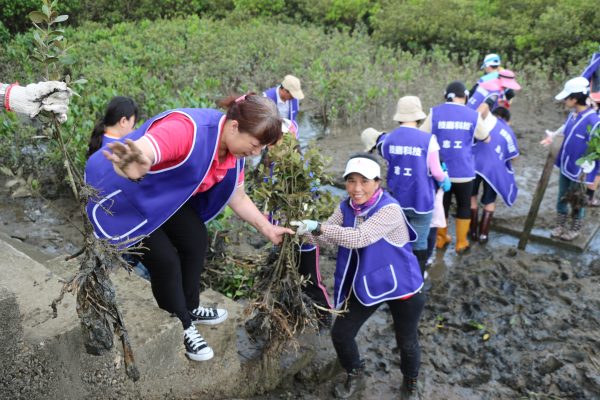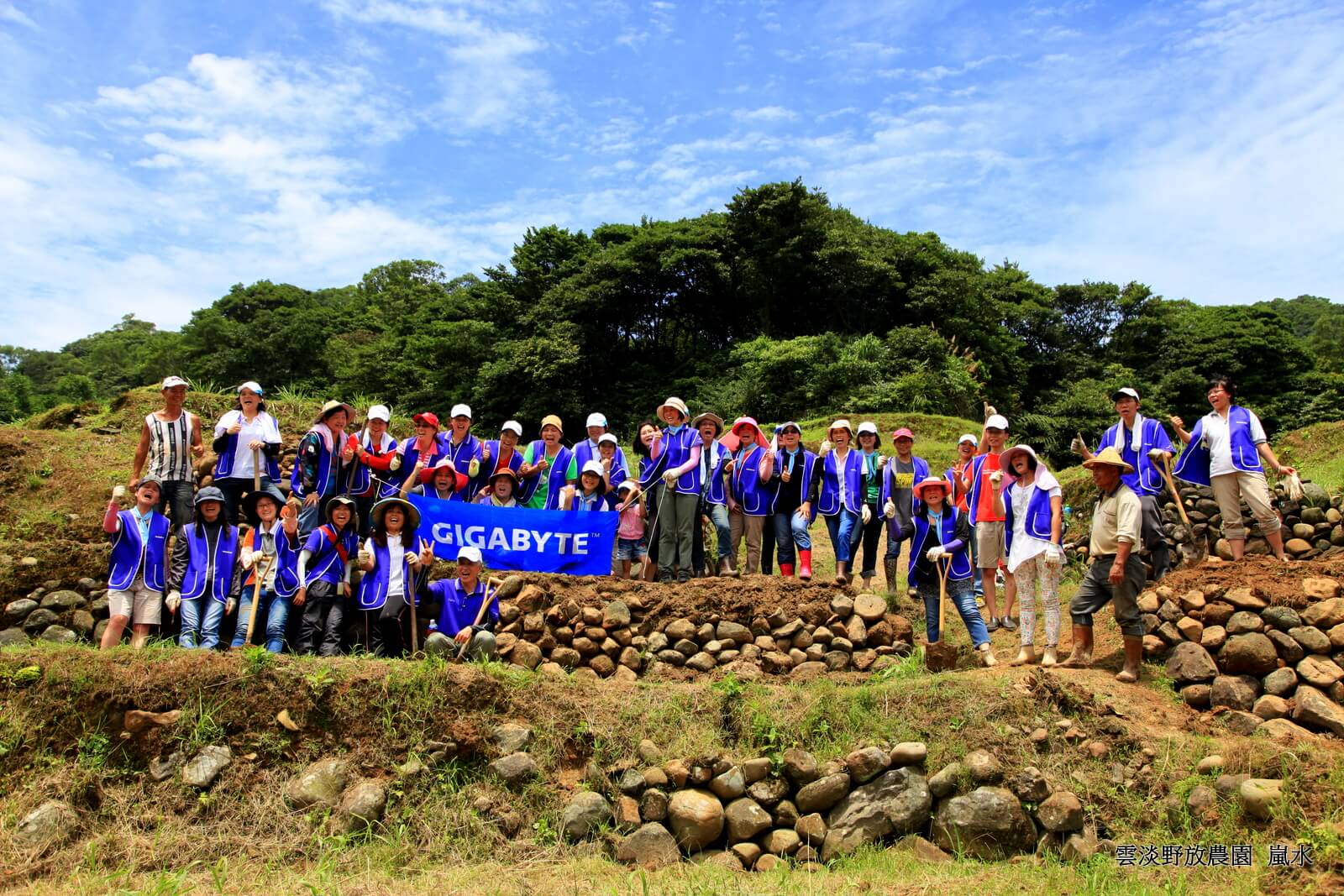“Working holiday” is a new form of leisure as well as a new form of volunteering. Simply put, people serve as volunteers on their vacations or school holidays. They provide services to the communities and society and in the meanwhile enjoy the fun.
Working holidays are not all about fun or getting close to nature. It also involves physical labor such as planting trees, mountain clean-ups, rehabilitation of slope vegetation, and the construction of eco-ponds. By living and working in the great outdoors, volunteers can become a part of the local landscape and cultural environment. They get to experience nature, relax, learn how to live in harmony with nature, and how to make their own contribution to the natural environment. Working during holidays, and holidaying while holidaying; serving society and serving yourself – this is what makes working holidays so unique.
Planting Trees, Giving Back to Earth
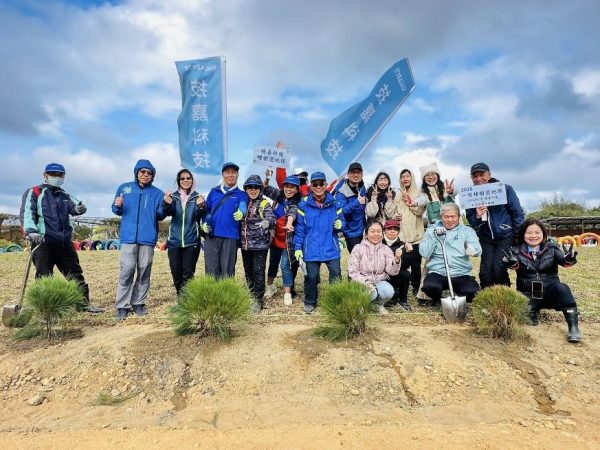
On the very first day of 2026, GIGABYTE kicked off the year with a sustainability action. We rallied 55 volunteers and their families from the GIGABYTE Green Club to plant trees at Miaoliʼs Colorful Movie Park, adding fresh greenery to the grounds.
Despite the cold, our volunteers worked with dedication—drilling holes with professional tools, carefully spacing for future growth, and planting 50 Casuarina trees. Each sapling was covered with soil and watered with care, symbolizing hope for a thriving future.
This initiative marks the beginning of GIGABYTEʼs 2026 sustainability journey. We will continue to unite employees in protecting the environment and creating a greener tomorrow.
- Home
- Innovation Management
- The Guanxi Blue Zone
- The Ocean is Our Home
- From the Chairman
- Commitment to CSR
- Stakeholder Engagement
- Material Topics
- SDGs
- Corporate Organization
- Code of Conduct
- Information Security & Privacy
- Risk Management
- Supply Chain Management
- Tetralogy of Supply Chain Engagement
- Conflict Mineral
- Environmental Management Policy
- Brand Strategy and Business Reputation Management
- Climate Strategy and Risk Management
- Customer Relations Management
- Eco-friendly Product
- Extended Product Responsibility
- Biodiversity
- Circular Economy
- Green Action
- Sustainability/Environmental Education
- Green Activities
- Working Holiday
- Corporate Volunteering
- Go Green Taiwan
- Make Earth Green Again
- Tree Map
- Overview/Core Concept
- Rooftop Farm
- Ecology Photo Competition
- Resource Hub
- Diverse and Inclusive Workplace
- Talent Management
- Human Rights Management
- Talent Cultivation and Development
- Occupational Safety
- Health Care
- Upgrade Your Life
- Social Inclusion
- CSR Milestone
- Economic Aspect
- Environmental Aspect
- Social Aspect
- CSR Report
Green Action at Sun Town Culture and Art Park – Tree Planting Event
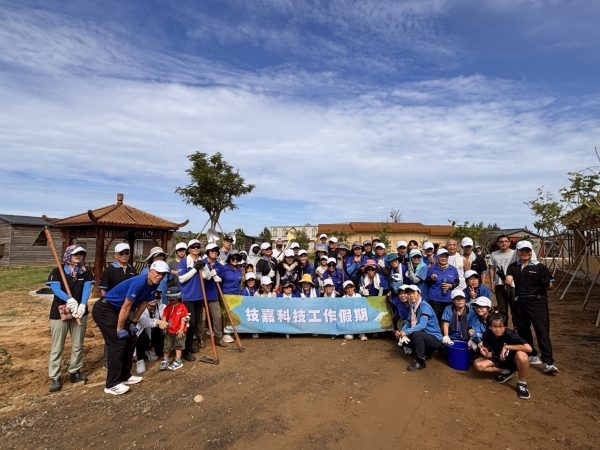
On September 20, 2025, GIGABYTE was invited to Sun Town Culture and Art Park for a tree-planting event. A total of 70 enthusiastic volunteers joined volunteer forces under the bright sun, planting nearly 300 Casuarina and Ligustrum trees to bring more greenery to the land. We look forward to these saplings growing into thriving trees, creating habitats for diverse life.
Through hands-on tree planting, employees embraced a sense of responsibility for environmental protection and experienced firsthand that safeguarding the planet requires real action from all of us. This event reflects GIGABYTE′s strong commitment to sustainability: “Planting hope, planting love for the Earth.”
- Home
- Innovation Management
- The Guanxi Blue Zone
- The Ocean is Our Home
- From the Chairman
- Commitment to CSR
- Stakeholder Engagement
- Material Topics
- SDGs
- Corporate Organization
- Code of Conduct
- Information Security & Privacy
- Risk Management
- Supply Chain Management
- Tetralogy of Supply Chain Engagement
- Conflict Mineral
- Environmental Management Policy
- Brand Strategy and Business Reputation Management
- Climate Strategy and Risk Management
- Customer Relations Management
- Eco-friendly Product
- Extended Product Responsibility
- Biodiversity
- Circular Economy
- Green Action
- Sustainability/Environmental Education
- Green Activities
- Working Holiday
- Corporate Volunteering
- Go Green Taiwan
- Make Earth Green Again
- Tree Map
- Overview/Core Concept
- Rooftop Farm
- Ecology Photo Competition
- Resource Hub
- Diverse and Inclusive Workplace
- Talent Management
- Human Rights Management
- Talent Cultivation and Development
- Occupational Safety
- Health Care
- Upgrade Your Life
- Social Inclusion
- CSR Milestone
- Economic Aspect
- Environmental Aspect
- Social Aspect
- CSR Report
Love the Land. Gard Leopard Cates
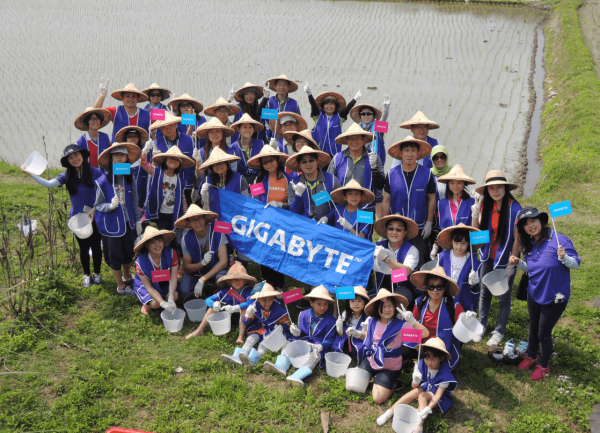
In the spring of 2018, employees of GIGABYTE entered the Fengshu Village for the third time. To help farmers alleviate the harm of snails to rice fields, everyone rolled up their trousers, stepped into the fields, and picked up snails. Good harvest needs a healthy ecosystem around the field, and also can encourage the farmers to continue preserving a safe habitat for leopard cats. GIGABYTE has supported environmentally-friendly “leopard cat rice” since 2015 and organized working holiday activities at the Fengshu Village for 3 consecutive years. We hope that all employees involving in the activities will keep supporting environmental-friendly products especially after participating in the process of growing environmental-friendly rice personally.
- Home
- Innovation Management
- The Guanxi Blue Zone
- The Ocean is Our Home
- From the Chairman
- Commitment to CSR
- Stakeholder Engagement
- Material Topics
- SDGs
- Corporate Organization
- Code of Conduct
- Information Security & Privacy
- Risk Management
- Supply Chain Management
- Tetralogy of Supply Chain Engagement
- Conflict Mineral
- Environmental Management Policy
- Brand Strategy and Business Reputation Management
- Climate Strategy and Risk Management
- Customer Relations Management
- Eco-friendly Product
- Extended Product Responsibility
- Biodiversity
- Circular Economy
- Green Action
- Sustainability/Environmental Education
- Green Activities
- Working Holiday
- Corporate Volunteering
- Go Green Taiwan
- Make Earth Green Again
- Tree Map
- Overview/Core Concept
- Rooftop Farm
- Ecology Photo Competition
- Resource Hub
- Diverse and Inclusive Workplace
- Talent Management
- Human Rights Management
- Talent Cultivation and Development
- Occupational Safety
- Health Care
- Upgrade Your Life
- Social Inclusion
- CSR Milestone
- Economic Aspect
- Environmental Aspect
- Social Aspect
- CSR Report
Hugging Nature. Connecting Humans with Leopard Cats
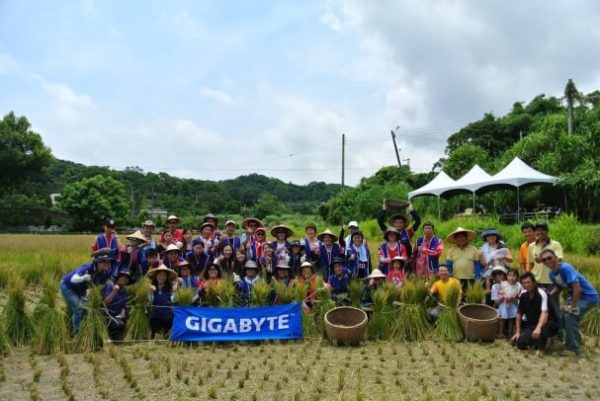
In July of 2017, 45 employees visited the Fengshu Village again. This time they worked in the rice field and participated in the production process of the “leopard cat rice” using ancient agricultural machinery and harvesting skills.
In addition to the harvesting work, we helped the residents of the community to build “hotels” for solitary bees to make the surroundings of the leopard cat field friendlier to the ecology. Employees perceived the philosophy of “friendliness” through personal participation in this activity and understood that every creature has its value. As a part of nature, humans should not think only from the perspective of the “human”. Rather, we should expand our horizon to all things in nature. Being friendly to the human, to the environment, and then to the society, we learn how to co-exist with nature and find a way for coexistence and mutual prosperity.
- Home
- Innovation Management
- The Guanxi Blue Zone
- The Ocean is Our Home
- From the Chairman
- Commitment to CSR
- Stakeholder Engagement
- Material Topics
- SDGs
- Corporate Organization
- Code of Conduct
- Information Security & Privacy
- Risk Management
- Supply Chain Management
- Tetralogy of Supply Chain Engagement
- Conflict Mineral
- Environmental Management Policy
- Brand Strategy and Business Reputation Management
- Climate Strategy and Risk Management
- Customer Relations Management
- Eco-friendly Product
- Extended Product Responsibility
- Biodiversity
- Circular Economy
- Green Action
- Sustainability/Environmental Education
- Green Activities
- Working Holiday
- Corporate Volunteering
- Go Green Taiwan
- Make Earth Green Again
- Tree Map
- Overview/Core Concept
- Rooftop Farm
- Ecology Photo Competition
- Resource Hub
- Diverse and Inclusive Workplace
- Talent Management
- Human Rights Management
- Talent Cultivation and Development
- Occupational Safety
- Health Care
- Upgrade Your Life
- Social Inclusion
- CSR Milestone
- Economic Aspect
- Environmental Aspect
- Social Aspect
- CSR Report
Guarding Leopard Cats and Forest Protection
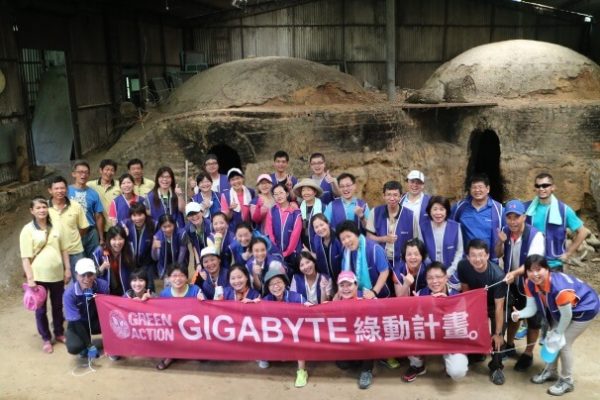
GIGABYTE began supporting environmentally friendly Leopard Cat Rice in 2015. In June 2016., we hosted the “Guarding Leopard Cats and Forest Protection” working holiday where nearly 40 GIGABYTE employees traveled to the Fengshu Village community in Tongxiao, Miaoli, to learn about the environmentally friendly rice-growing technique of the local people. The local people insist on not using chemical fertilizers and pesticides in order to increase biodiversity around their fields. This in turn provided the Leopard Cat with a safe area to move and hunt in.
Fengshu Village is also home to the only intact charcoal kiln in Taiwan. The area was once home to a thriving charcoal industry but changes in the economy meant the kiln became abandoned and was in danger of collapsing. GIGABYTE employees joined old local craftsmen in learning how to repair the charcoal kiln. They also helped the residents with thinning the forests to give trees enough space to grow their canopy. The space will also be used by the community to teach local history and environmental education in the future.
- Home
- Innovation Management
- The Guanxi Blue Zone
- The Ocean is Our Home
- From the Chairman
- Commitment to CSR
- Stakeholder Engagement
- Material Topics
- SDGs
- Corporate Organization
- Code of Conduct
- Information Security & Privacy
- Risk Management
- Supply Chain Management
- Tetralogy of Supply Chain Engagement
- Conflict Mineral
- Environmental Management Policy
- Brand Strategy and Business Reputation Management
- Climate Strategy and Risk Management
- Customer Relations Management
- Eco-friendly Product
- Extended Product Responsibility
- Biodiversity
- Circular Economy
- Green Action
- Sustainability/Environmental Education
- Green Activities
- Working Holiday
- Corporate Volunteering
- Go Green Taiwan
- Make Earth Green Again
- Tree Map
- Overview/Core Concept
- Rooftop Farm
- Ecology Photo Competition
- Resource Hub
- Diverse and Inclusive Workplace
- Talent Management
- Human Rights Management
- Talent Cultivation and Development
- Occupational Safety
- Health Care
- Upgrade Your Life
- Social Inclusion
- CSR Milestone
- Economic Aspect
- Environmental Aspect
- Social Aspect
- CSR Report
Embracing Nature and Exploring the Countryside
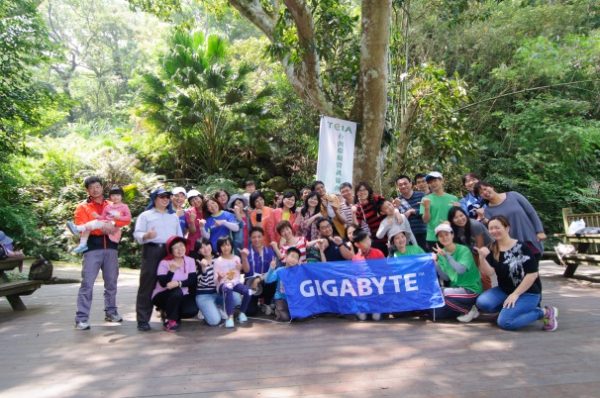
In April of 2015, GIGABYTE employees visited the first successful example of a non-profit environmental protection trust in Taiwan – the “Natural Valley Environmental Education Base.”
Environmental trust is originally intended as a way to protect natural forests. Facing the threat from drought conditions nowadays, we must protect the forests in order to guarantee the supply of water sources. This is because water makes its home in the forest. GIGABYTE employees used eco-engineering techniques to rehabilitate the stream and build homes for fish. Wild grass and rocks were removed from the stream to give the fish and shrimp room to move. Other employees helped weed a plot of land being cultivated using the natural farming method. During the process, they learned how to tell the difference between crops and weeds. Observing and identifying crops in the fields was a far more rewarding experience than purchasing vegetables in supermarkets that have already been harvested and bagged. This working holiday showed the local people the dedication and enthusiasm of GIGABYTE employees. It helped build trust between people and their love of nature. This will in turn encourage more people to continue fighting for their own living environment and pass on the beauty of nature to their next generation.
- Home
- Innovation Management
- The Guanxi Blue Zone
- The Ocean is Our Home
- From the Chairman
- Commitment to CSR
- Stakeholder Engagement
- Material Topics
- SDGs
- Corporate Organization
- Code of Conduct
- Information Security & Privacy
- Risk Management
- Supply Chain Management
- Tetralogy of Supply Chain Engagement
- Conflict Mineral
- Environmental Management Policy
- Brand Strategy and Business Reputation Management
- Climate Strategy and Risk Management
- Customer Relations Management
- Eco-friendly Product
- Extended Product Responsibility
- Biodiversity
- Circular Economy
- Green Action
- Sustainability/Environmental Education
- Green Activities
- Working Holiday
- Corporate Volunteering
- Go Green Taiwan
- Make Earth Green Again
- Tree Map
- Overview/Core Concept
- Rooftop Farm
- Ecology Photo Competition
- Resource Hub
- Diverse and Inclusive Workplace
- Talent Management
- Human Rights Management
- Talent Cultivation and Development
- Occupational Safety
- Health Care
- Upgrade Your Life
- Social Inclusion
- CSR Milestone
- Economic Aspect
- Environmental Aspect
- Social Aspect
- CSR Report
An Encounter with Mangroves
In 2014, Go Green Club expanded its environmental action by cooperating with the “Yongxing Township Community Development Association of Xinwu District” and “Taoyuan Local Alliance” to protect Guanxin Algal Reef. “Working Holiday- An Encounter with Mangroves” and “Fall in Love with Algal Reef Workshop” served as the start of our protection efforts. The algal reef at Guanyin and Xinwu District is made up of calcareous material secreted by calcareous algae. On average, it grows less than 1 centimeter every 10 years. This unique coastal landscape used to stretch along more than 27km along the west coast. Unfortunately, due to land development, seawall construction, and pollution, only 4km of natural algal reefs are left in coastal areas in Guanyin and Xinwu.
Lobbying by the local community eventually led to the area being designated by the government as the “Guanxin Algal Reef Ecosystem Wildlife Refuge.” All developing activities are now banned within the refuge and restrictions will be placed on fishing as well.
- Home
- Innovation Management
- The Guanxi Blue Zone
- The Ocean is Our Home
- From the Chairman
- Commitment to CSR
- Stakeholder Engagement
- Material Topics
- SDGs
- Corporate Organization
- Code of Conduct
- Information Security & Privacy
- Risk Management
- Supply Chain Management
- Tetralogy of Supply Chain Engagement
- Conflict Mineral
- Environmental Management Policy
- Brand Strategy and Business Reputation Management
- Climate Strategy and Risk Management
- Customer Relations Management
- Eco-friendly Product
- Extended Product Responsibility
- Biodiversity
- Circular Economy
- Green Action
- Sustainability/Environmental Education
- Green Activities
- Working Holiday
- Corporate Volunteering
- Go Green Taiwan
- Make Earth Green Again
- Tree Map
- Overview/Core Concept
- Rooftop Farm
- Ecology Photo Competition
- Resource Hub
- Diverse and Inclusive Workplace
- Talent Management
- Human Rights Management
- Talent Cultivation and Development
- Occupational Safety
- Health Care
- Upgrade Your Life
- Social Inclusion
- CSR Milestone
- Economic Aspect
- Environmental Aspect
- Social Aspect
- CSR Report
Knock, Knock – Trail-Building Working Holiday
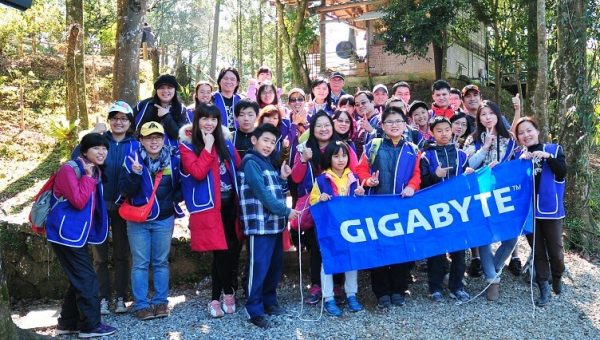
Many shallow mountains and foothills of Taiwan offer a perfect place for weekend trips. However, many suburban and park trails built in earlier years did not take their surrounding environment and geology into account. This led to many trails being built out of concrete, bitumen, rubber tires, or improperly spaced wooden trestles. These not only prevent the free movement of animals but also suffer from poor design, making them look bad and feel uncomfortable to walk on.
The Taiwan Thousand Miles Trail Association follows the “hand-built trail” concept of the Appalachian Trails in the US. It surveys suburban and park trail systems and collects geologic, ecological, geographic, and cultural information as well as locally accessible resources to tailor trails that take local conditions into account. The power of the community is then used to jointly maintain and refurbish trails with eco-engineering techniques. Such a sophisticated approach not only corrects the flaws of the original trail but also allows mankind and wildlife to share the same space without conflict. Volunteers from GIGABYTE learn how to observe and understand the land during the construction process.
- Home
- Innovation Management
- The Guanxi Blue Zone
- The Ocean is Our Home
- From the Chairman
- Commitment to CSR
- Stakeholder Engagement
- Material Topics
- SDGs
- Corporate Organization
- Code of Conduct
- Information Security & Privacy
- Risk Management
- Supply Chain Management
- Tetralogy of Supply Chain Engagement
- Conflict Mineral
- Environmental Management Policy
- Brand Strategy and Business Reputation Management
- Climate Strategy and Risk Management
- Customer Relations Management
- Eco-friendly Product
- Extended Product Responsibility
- Biodiversity
- Circular Economy
- Green Action
- Sustainability/Environmental Education
- Green Activities
- Working Holiday
- Corporate Volunteering
- Go Green Taiwan
- Make Earth Green Again
- Tree Map
- Overview/Core Concept
- Rooftop Farm
- Ecology Photo Competition
- Resource Hub
- Diverse and Inclusive Workplace
- Talent Management
- Human Rights Management
- Talent Cultivation and Development
- Occupational Safety
- Health Care
- Upgrade Your Life
- Social Inclusion
- CSR Milestone
- Economic Aspect
- Environmental Aspect
- Social Aspect
- CSR Report
Working Holiday – Aquatic Habitat Maintenance
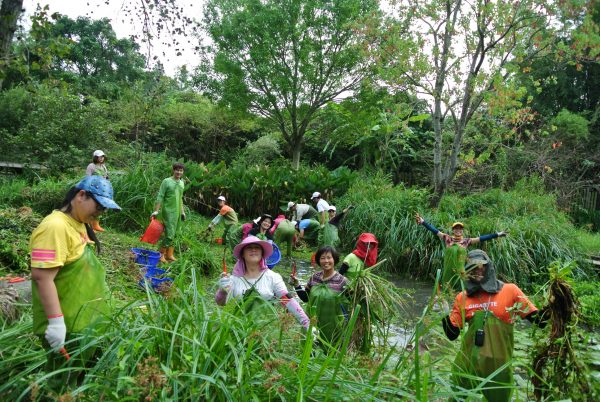
The eco-diversity of wetlands is second only to tropical rainforests. They also help with mitigating floods, improving water quality, providing habitats, supporting the economy, regulating the groundwater table, preserving species, giving natural education, and other functions.
At the end of 2014, members of the Go Green Club visited the aquatic vegetation pool at the “Luodong Natural Education Center”. There, a course and actual hands-on maintenance taught them more about natural habitats and the importance of ecological conservation. Volunteers learned more than just the maintenance and management of aquatic regions during this habitat maintenance session. Outdoor tours and hands-on practice also taught them about many unusual creatures and how to take care of aquatic vegetation ponds. It also fostered a positive relationship between the volunteers and nature.
- Home
- Innovation Management
- The Guanxi Blue Zone
- The Ocean is Our Home
- From the Chairman
- Commitment to CSR
- Stakeholder Engagement
- Material Topics
- SDGs
- Corporate Organization
- Code of Conduct
- Information Security & Privacy
- Risk Management
- Supply Chain Management
- Tetralogy of Supply Chain Engagement
- Conflict Mineral
- Environmental Management Policy
- Brand Strategy and Business Reputation Management
- Climate Strategy and Risk Management
- Customer Relations Management
- Eco-friendly Product
- Extended Product Responsibility
- Biodiversity
- Circular Economy
- Green Action
- Sustainability/Environmental Education
- Green Activities
- Working Holiday
- Corporate Volunteering
- Go Green Taiwan
- Make Earth Green Again
- Tree Map
- Overview/Core Concept
- Rooftop Farm
- Ecology Photo Competition
- Resource Hub
- Diverse and Inclusive Workplace
- Talent Management
- Human Rights Management
- Talent Cultivation and Development
- Occupational Safety
- Health Care
- Upgrade Your Life
- Social Inclusion
- CSR Milestone
- Economic Aspect
- Environmental Aspect
- Social Aspect
- CSR Report
Restoring the Glamor of Century-Old Terraced Fields
A working holiday was organized in Spring with the Shimensongshan Community on the north coast. Participants had the opportunity of learning how traditional stone terraced fields were built and helping the old farmers with maintaining the field embankments. During the process, members gained an understanding of the traditional farming methods typical at the northern coast, the economic and historical background of water rice terraces, as well as agriculture issues that farmers currently face in Taiwan.
Apart from learning through rural labor, we chose water terraced fields in the shallow mountain region as the location of the holiday. Their unique geography and eco-friendly farming practices that shun the use of chemical fertilizers and pesticides helped nurture an environment rich in bio-diversity. The local settlement is of both cultural and ecological significance so conforms to the definition of the “Satoyama Landscape” proposed by Japan at the Conference of the Parties to the Convention on Biological Diversity. This complex farm village ecosystem was formed by long-time interaction between human activity and natural forces. It is therefore of tremendous heritage value as an example of how biodiversity can be balanced with sustainable use of resources.
- Home
- Innovation Management
- The Guanxi Blue Zone
- The Ocean is Our Home
- From the Chairman
- Commitment to CSR
- Stakeholder Engagement
- Material Topics
- SDGs
- Corporate Organization
- Code of Conduct
- Information Security & Privacy
- Risk Management
- Supply Chain Management
- Tetralogy of Supply Chain Engagement
- Conflict Mineral
- Environmental Management Policy
- Brand Strategy and Business Reputation Management
- Climate Strategy and Risk Management
- Customer Relations Management
- Eco-friendly Product
- Extended Product Responsibility
- Biodiversity
- Circular Economy
- Green Action
- Sustainability/Environmental Education
- Green Activities
- Working Holiday
- Corporate Volunteering
- Go Green Taiwan
- Make Earth Green Again
- Tree Map
- Overview/Core Concept
- Rooftop Farm
- Ecology Photo Competition
- Resource Hub
- Diverse and Inclusive Workplace
- Talent Management
- Human Rights Management
- Talent Cultivation and Development
- Occupational Safety
- Health Care
- Upgrade Your Life
- Social Inclusion
- CSR Milestone
- Economic Aspect
- Environmental Aspect
- Social Aspect
- CSR Report
- Home
- Innovation Management
- The Guanxi Blue Zone
- The Ocean is Our Home
- From the Chairman
- Commitment to CSR
- Stakeholder Engagement
- Material Topics
- SDGs
- Corporate Organization
- Code of Conduct
- Information Security & Privacy
- Risk Management
- Supply Chain Management
- Tetralogy of Supply Chain Engagement
- Conflict Mineral
- Environmental Management Policy
- Brand Strategy and Business Reputation Management
- Climate Strategy and Risk Management
- Customer Relations Management
- Eco-friendly Product
- Extended Product Responsibility
- Biodiversity
- Circular Economy
- Green Action
- Sustainability/Environmental Education
- Green Activities
- Working Holiday
- Corporate Volunteering
- Go Green Taiwan
- Make Earth Green Again
- Tree Map
- Overview/Core Concept
- Rooftop Farm
- Ecology Photo Competition
- Resource Hub
- Diverse and Inclusive Workplace
- Talent Management
- Human Rights Management
- Talent Cultivation and Development
- Occupational Safety
- Health Care
- Upgrade Your Life
- Social Inclusion
- CSR Milestone
- Economic Aspect
- Environmental Aspect
- Social Aspect
- CSR Report

